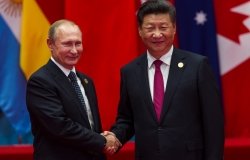Facing North Korea: The Challenges of Coordinating U.S. and Japanese Policy
Overview
By Alexei Kral
January 15, 1999 Asia Program seminar featuring Kenneth Pyle, professor of history and Asian studies, University of Washington, and president, National Bureau of Asian Research. "The truth is Japan is in an extraordinarily reactive low posture with regard to an issue that is of critical importance to its political and economic future," Kenneth Pyle, a leading scholar of Japanese history, argued. Pyle was referring to Japan's policy towards North Korea. Until the Korean issue is resolved, the structure of international relations in East Asia will remain unclear, he observed.
The course North Korea takes in the coming years will have immense implications for Japan's foreign relations and its economic and security interests, Pyle asserted. Nevertheless, Japan is likely to maintain its adaptive and reactive, low posture, which has historically been "Japan's characteristic diplomatic style in periods of uncertainty and flux associated with transformation of the international system," he predicted. Pyle noted that the U.S. and Japan have common interests regarding North Korea. Both countries seek to avert war on the Korean peninsula, to maintain a stable balance of power in Northeast Asia, to prevent North Korea from developing and testing nuclear weapons and from exporting and deploying ballistic missiles, and to promote dialogue between North and South Korea.
Still, there is tension when it comes to coordinating U.S. and Japanese policies, Pyle remarked. The U.S. has an alliance with South Korea and maintains military bases there, so Washington normally seeks to dominate strategy towards the Korean peninsula, while maximizing Japanese support, he observed. Pyle also noted that the U.S. feels Japan claims the status of a major power, but not the associated obligations and burdens, particularly participation in collective defense. Japan, on the other hand, feels it should be consulted more on Korean issues because it has provided extensive financial assistance to North Korea, and would be called upon to provide potentially huge amounts of aid should North Korea collapse. Specifically, Japan wants to be included in the Four Power Talks that are now limited to North Korea, South Korea, China, and the U.S., Pyle observed.
Pyle pointed to a number of domestic and international factors that present obstacles to Japan taking a higher profile and a more active policy towards North Korea. Japan's postwar political-economic framework focusing on economic growth has left it with a weak prime ministership and weak crisis management, he argued. Japan's colonial and World War II history and the residual suspicion of its neighbors, particularly Korea, prevent it from playing a proactive role in the region, Pyle added. He also emphasized that the Japan-U.S. alliance takes precedence in all Japanese foreign policymaking and Japan has repeatedly been compelled to defer to American leadership on Korean issues. Pyle noted additional constraints, including Japan's commitment not to undertake any North Korean initiatives without South Korean approval, North Korea's apparent disinterest in improving relations, Japan's concern about relations with China and Russia, and Japan's economic crisis. For these reasons, he asserted, Japan would not take the lead in Korean diplomacy, but would be cautious, circumspect, and adaptive to the process of Korean unification as it develops. Pyle suggested a number of immediate steps for a common U.S.-Japanese approach to North Korea. The top priority should be to both reinforce the 1994 Framework Agreement between the U.S. and North Korea and to dissuade North Korea from further testing, export, and deployment of missiles. According to Pyle, several other initiatives should be pursued: the Japanese parliament should pass legislation to facilitate Japan's defense cooperation with the U.S.; the U.S., Japan, and South Korea should conduct more trilateral consultations on instability in North Korea; the U.S. and Japan should cooperate on developing a theater missile defense system that would shoot down missiles in flight; and finally, the U.S. should support forming a regional six power consultation group to focus on preventive diplomacy and greater transparency in defense matters.
Whatever scenario emerges -- conflict with North Korea, collapse of North Korea and absorption by South Korea, or Korean reunification through peaceful coexistence -- Pyle concluded, "Japan's active cooperation will be critical."
Hosted By

Indo-Pacific Program
The Indo-Pacific Program promotes policy debate and intellectual discussions on US interests in the Asia-Pacific as well as political, economic, security, and social issues relating to the world’s most populous and economically dynamic region. Read more
Thank you for your interest in this event. Please send any feedback or questions to our Events staff.










